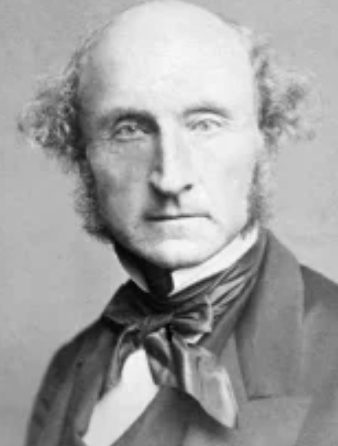On this date in 1806, John Stuart Mill was born in England. Mill, who met Jeremy Bentham as a young man, became a champion of individual liberty. With Bentham, Mill advanced utilitarianism, a philosophy advocating that the role of government is to create the greatest amount of good with the least evil. Mill, known for his clear writing style and compelling logic, advanced and popularized such ideals as social and sexual equality, the public ownership of national resources, and political liberty.
Mill was tutored at a tender age by his father, James Mill, who was an agnostic. Mill could not remember a time when he could not read Greek, writing in his autobiography that he started Greek study by age 3.
Mill wrote in his Autobiography (1873) that his father “impressed upon me from the first, that the manner in which the world came into existence was a subject on which nothing was known: that the question, ‘Who made me?’ cannot be answered, because we have no experience or authentic information from which to answer it; and that any answer only throws the difficulty a step further back, since the question immediately presents itself, ‘Who made God?’ “
Even as a teen, Mill wrote a defense of skeptic Richard Carlile, jailed for six years for “blasphemous libel.” After a clerkship in India House (headquarters of the East India Company), Mill became part of the “philosophic Radicals,” and wrote for a number of journals. A System of Logic, in two volumes, came out in 1843, followed by Principles of Political Economy (1848), On Liberty (1859), Utilitarianism (1863) and The Subjection of Women (1869). The latter book was influenced by his wife Harriet Hardy Taylor, a longtime friend whom Mill married in 1851.
In On Liberty, a work dedicated to his wife, who died in 1858, Mill rejected a standard of ethics predicated on obedience, or the crushing of individuality, whether by “enforcing the will of God or the injunctions of men.” Mill termed Christianity “essentially a doctrine of passive obedience; it inculcates submission to all authorities found established.” Mill was a member of Parliament from 1865-68, rising to the defense of Charles Bradlaugh, the atheist politician who had to fight for years to be seated in Parliament.
Although Mill’s views were unpopular, Gladstone once referred to Mill as “the saint of Rationalism.” Mill’s Reform Bill of 1867, the first attempt to grant the vote to British women, while unsuccessful, ignited the British suffrage movement.
Three essays on religion were published posthumously. In them, Mill hints that he had adopted a deistic belief in what he termed a “limited liability god,” surprising his freethinking friends. Mill wrote in Utility of Religion, published in 1874, that belief “in the supernatural … cannot be considered to be any longer required.” He wrote in his Autobiography (1873): “The world would be astonished if it knew how great a proportion of its brightest ornaments — of those most distinguished even in popular estimation for wisdom and virtue — are complete skeptics in religion.” (D. 1873)

